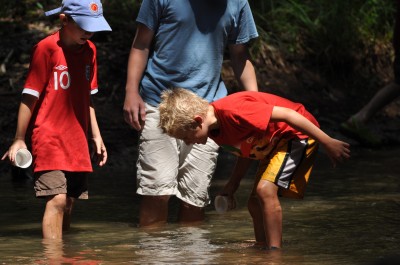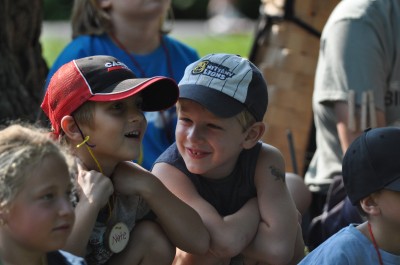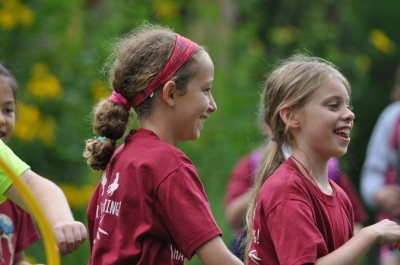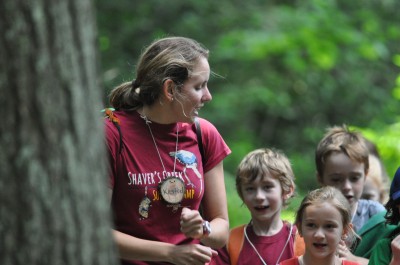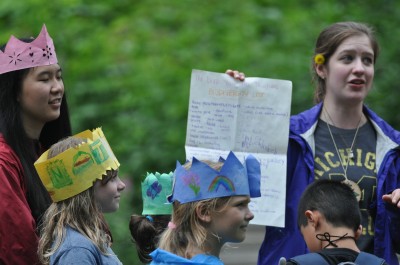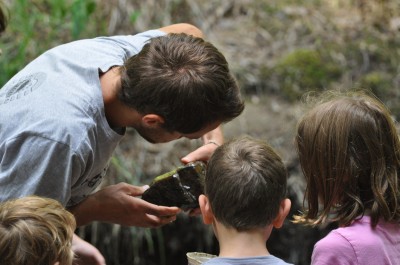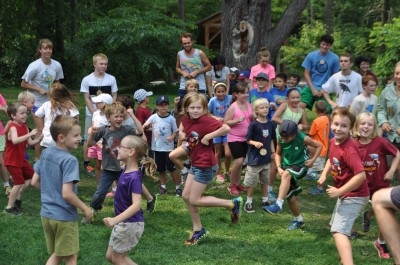“Can you imagine being the age you are today and to never have been in the woods?” Campers are stunned as their counselor Acorn (Kayla Czekaj) poses this unbelievable question to them after a reading of Dr. Suess’ The Lorax. As they sit in Fox’s Den, surrounded by trees and the chirping birds, they are asked to imagine a childhood where they could not play in the woods. Halfway through their week of Explorer Camp at Shaver’s Creek, they have spent hours in the forest playing camouflage, building mouse houses, and exploring the habitats all around them. The thought of not experiencing that bewilders them.
Their bewilderment is understandable, as many of these kids have been campers practically since they could walk. Their still-unfolding childhood has been filled with hours of playing outside, partially thanks to Shaver’s Creek, dedicated camp staff, and parents for enabling that experience here. In those brief moments of reflection under a canopy of white pines and white oaks, the importance of their time at camp is obviously apparent to them.
What would that be like? Thankfully, those campers will never have to know what it’s like to not be able to spend time in the great outdoors. But for many other kids, that “what if” is a reality they face every day. Whether it is because of where they live, because of parent fears, or because of the alluring pull of colorful screens, the reasons are endless. Many aren’t even aware of what it is they are missing out on. A lack of being outdoors (sometimes called “nature-deficit disorder,” a term coined by Last Child in the Woods author Richard Louv) is scientifically linked to attention disorders, depression, anxiety, obesity, problems in school, and can even lead to an overall shorter lifespan. All of these effects are especially evident when it is children who are experiencing the deficit. It’s upsetting to hear such facts, but there is a positive spin that can be put on them. If a lack of nature can cause so many problems, that means that working to help expose kids to the natural world can have amazing benefits.
So what can be done? One of the best answers was all around me this summer: camp. Like I said before, two of the biggest factors leading to kids experiencing a nature-deficit are simply lack of access and fears from parents about sending their kids out into the “wild.” Camp, however, is the ideal situation. When at camp, kids are able to experience the magic of being outdoors in an environment where they are safe and the place they go to is, more often than not, one that values nature in one way or another.
But camp is also an incredibly special place that all kids should be able to experience. Many of my best friends and my warmest memories come from long summers spent by a lake, in the woods, or by a campfire. Being at camp allows for a connection to nature that many kids do not get during the remainder of the year, but it also allows a special connection to people and opportunities. For some, a summer camp may also be their first time away from mom or dad, which can help kids to find themselves and have more freedom. Whether kids do it once, or twice, or a dozen times, and whether it’s for one week or a whole summer, the exposure to summer camp alone is sometimes enough to spark a love for adventure and the outdoors. That spark can lead to a lifetime of joy, fun, and all around well-being.
The problems that come with a nature deficit are real, but they aren’t unbeatable. Sign your kids, grandkids, future kids, or nieces and nephews up for a summer camp. Or better yet, go outside as a family whenever you can! Take them outside, teach them about the world they live in, and how to appreciate everything it has to offer. And above all, never stop discovering.

